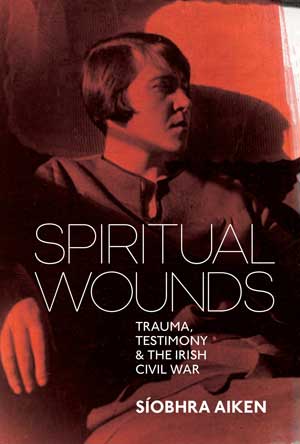SPIRITUAL WOUNDS: TRAUMA TESTIMONY & THE IRISH CIVIL WAR
Published in Book Reviews, Book Reviews, Issue 5 (September/October 2022), Reviews, Volume 30SÍOBHRA AIKEN
Irish Academic Press
€29.95
ISBN: 9781788551663
Reviewed by Colum Kenny
Colum Kenny is the author of: A bitter winter: the Civil War and its legacy (Eastwood Books, 2022). Forthcoming.
In 1967 Irish Civil War veteran George Lennon (1900–1991) was in Rochester, New York, protesting with others against US involvement in the Vietnam War. That same year Frank Aiken (1898–1983), a Civil War veteran and minister for external affairs, ensured that a planned RTÉ trip to Vietnam was cancelled lest it incur US displeasure.
Lennon had emigrated, troubled by his memories of executing an RIC constable. He had also, in his view, cruelly treated a female revolutionary who ostensibly committed suicide. Frank Aiken had become IRA chief-of-staff towards the end of the Civil War, and had prevously led the IRA division responsible for a murderous atrocity in the Protestant village of Altnaveigh, Co. Armagh.
Lennon abroad wrote extensively about the brutality of the Irish troubles and their personal impact. Throughout his life his ‘bad nervous breakdowns’ recurred. Aiken at home was highly reticent, ‘never speaking to his family about his own actions as a perpetrator or of the suffering inflicted on those close to him’, writes his great-granddaughter in her new book. Such silences can be very eloquent in their own way.
Síobhra Aiken’s Spiritual Wounds: Trauma Testimony and the Irish Civil War draws heavily on vivid writings by Lennon and some other veterans, to make visible what was for too long an unmentionable or unmentioned national trauma. It is a well-researched and very readable book.
Frank Aiken himself became a pillar of a later censorious Ireland in which a sharp intake of breath though clenched teeth signalled what should be left unsaid—sexually, socially or politically. A disastrous civil war had damaged the new state. Discussion of it, in this Decade of Centenaries, is generally reserved rather than challenging. Aiken’s book shows that this need not be so. She considers texts that might be the stuff of low-cost but gripping TV plays and discussions. The endnotes alone are rich with information.
The author justifies her mining of what some might dismiss as mere ‘fiction’ by demonstrating that books and short stories published by survivors may include at least as much autobiographical information in their own way as some formal witness statements. However, by relying heavily on such accounts she also forefronts the trauma of participants in the fighting rather than the wounds of the population at large.
Those whose ancestors’ lives were turned upside down by the loss of a breadwinner or other family member may disagree with veteran Desmond Ryan’s asserion in 1936 that ‘the deepest wounds of the Civil War were spiritual wounds’. But no doubt the psychological impact on individuals and on the new state was immense, and some participants found writing about it personally helpful. This was ‘therapeutic testimony’, notes Aiken.
Readers of her book may be surprised to find that psychological language was used at the time of the Civil War to brand women as ‘hysterical’, and otherwise to stigmatize and silence people. As early as 1903, in Arthur Griffith’s United Irishman, the socialist Fred Ryan took issue with W.B. Yeats for depicting nationalist fervour in a way that Ryan saw as attempting to define advanced nationalists clinically and thus reduce patriotism to pathology.
From ‘therapeutic testimony’ Aiken moves to women’s pain, and to indications of sexual violence that she thinks have been hidden in plain sight. It was not the case that nobody wished to articulate what happened during the Civil War. But sometimes too few people wanted to hear what was said. Síobhra Aiken distinguishes between the experiences of men and women in sensitive and subtle ways. While drawing on the methodology of literary criticism and feminism, she largely avoids shoehorning examples into an abstract theoretical framework, although occasionally a single quotation seems basis enough for her to make a broad statement about some author’s general view.
Her last two chapters deal with the phenomena of ‘spiritual exiles and exiled emigrants’, and perpetrator testimony. She deftly but compassionately unpicks the defensive mechanisms that participants used to make meaning of their decisions to emigrate or of their own brutality. As the fate of Frank Aiken shows, not all those on the ‘losing side’ in the Civil War had tragic ends. While Seán MacBride, another former IRA chief-of-staff, went on to win the Nobel Peace Prize, Frank Aiken came to champion a non-aligned policy at the United Nations and won credit for the completion of the nuclear non-proliferation treaty of 1968. And where George Lennon found spiritual comfort in Zen Buddhism, Frank Aiken won the lasting respect of Tibetan Buddhists for his vigorous ministerial objections to China’s suppression of Tibet.
In 1998 the present reviewer met the Dalai Lama in north-eastern India. During that meeting I handed him a personal letter from the president of Ireland. As he turned over the envelope, unprompted by discussion of the matter, he touched the embossed golden harp of Ireland on its back and said just this: ‘Ah, Frank Aiken’. The Bureau of Military History invited Frank Aiken to send it a formal witness statement about his experiences in the Irish revolution. He chose not to do so. His great-granddaughter’s book helps to break the silence.

















